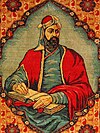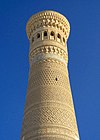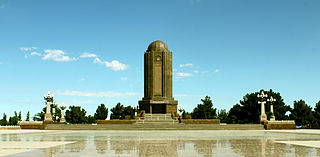
The Nizami Mausoleum, built in honor of the 12th-century Persian poet Nizami Ganjavi, stands just outside the city of Ganja, Azerbaijan. The mausoleum was originally built in 1947 in place of an old collapsed mausoleum, and rebuilt in its present form in 1991.

Nizami Rayon is a municipal district of the city of Baku, the capital of Azerbaijan. Its population is 201,239 and it includes the municipality of Keşlə. Of these, 25,626 lives in Keşlə municipality. The raion's area is 19.6 km².

The National museum of Azerbaijan literature named after Nizami Ganjavi is a museum in Baku, established in 1939. It is located near the entrance of Icheri Sheher, not far from the Fountains Square. The museum is considered one of the greatest and richest treasuries of Azerbaijani culture.

Vagif Mausoleum is a mausoleum located in Shusha, Azerbaijan. It is built to honor Molla Panah Vagif, a poet, diplomat and vizier

Zivar bay Garay bay oglu Ahmadbayov was the first Azerbaijani architect with higher education.
The Monument to Nizami Ganjavi, a medieval Persian poet, is located in Baku in Nizami Square, on the intersection of Istiglaliyyat, Ahmad Javad, Azerbaijan and Islam Safarli streets.

Hamid Mammadtaghi oglu Arasly was an Azerbaijani literary critic, Doctor of Sciences in Philology, and an academic at the Azerbaijan National Academy of Sciences. He is acknowledged as one of the most prominent literary critics and philologists of Azerbaijan.

Heydar Aliyev's cult of personality, also known as Heydarism, became a significant part of Azerbaijani politics and society after he came to power in 1993 and continuing after his death in 2003, when his son Ilham Aliyev succeeded him. Aliyev, a former Soviet politburo member and the leader of Soviet Azerbaijan from 1969 to 1987, became the President of Azerbaijan in 1993. He then began to carefully design an autocratic system, with heavy reliance on family and clan members, oil revenues and patronage.
Campaign on granting Nizami the status of the national poet of Azerbaijan is a politically and ideologically motivated distortion of the historical record of the national-cultural origin of one of the classics of Persian poetry, Nizami Ganjavi, which began in the USSR in the late 1930s and was arranged to coincide with the celebration of the 800th anniversary of the poet. The campaign was crowned with jubilee celebrations in 1947 but its effects continue up to this day: on one hand this process was beneficial for many cultures of the multi-cultural Soviet Union and for the Azerbaijani culture in the first place; on the other hand this brought to an extreme politicization of the question on Nizami's cultural-national identity in the USSR and in modern Azerbaijan.

Nizami is a historical opera written in 1939 by the composer Afrasiyab Badalbeyli. It is telling about the life of the poet Nizami Ganjavi. The music and the libretto of the opera were written by Afrasiyab Badalbeyli based on the plot and motives of Mammad Said Ordubadi's novel the "Sword and Feather". The premiere of the opera took place on 12 December 1948 at the Azerbaijan State Opera and Ballet Theatre.
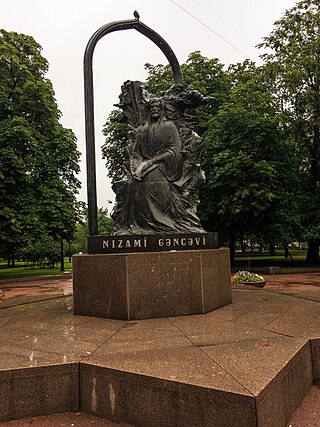
The Monument to Nizami Ganjavi in Saint Petersburg is located in a square situated between houses 25 and 27 on Kamennoostrovsky Prospekt.

The Monument to Nizami Ganjavi, the medieval Persian poet, is located in the capital of Italy, Rome, in Villa Borghese gardens, on Viale Madama Letizia Street. People's Artists of Azerbaijan, Salhab Mammadov and Ali Ibadullayev are the authors of the monument. The project was approved by The Commission on History and Arts of Rome.
The Monument to Nizami Ganjavi, a medieval Persian poet, is located in Chaoyang Park, in Beijing, China. Yuan Xikun, a Chinese artist, is the author of the monument.
The Monument to Nizami Ganjavi, a medieval Persian poet, is located in Chișinău, the capital of Moldova, in a park named after Nizami Ganjavi. Akif Asgarov, Honoured Art Worker of Azerbaijan was a sculptor and Semen Shoyket, Honoured Architect of Moldova was the architect of the monument.
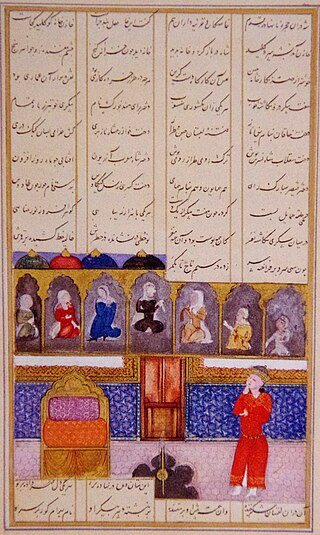
Haft Peykar also known as Bahramnameh is a romantic epic by Persian poet Nizami Ganjavi written in 1197. This poem forms one part of his Khamsa.

Ganja State History-Ethnography Museum named after Nizami Ganjavi is the largest museum in Ganja,
The monument to Nizami Ganjavi is a monument to the outstanding Persian poet Nizami Ganjavi, located in the hometown of the poet, Ganja, Azerbaijan. The monument was erected in 1946.

Gold medal named after Nizami Ganjavi is a state award of Azerbaijan. On May 16, 2014, it is established by National Assembly of Azerbaijan and awarded annually to Azerbaijani scientists and a foreigner scientist for their remarkable scientific works.
Ali Aziz oghlu Ibadullayev is an Azerbaijani sculptor and painter.
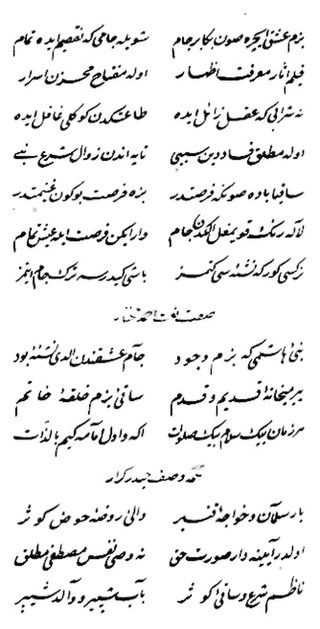
"Hashish and Wine", also known as "Opium and Wine", "Bangu Bada" or "Bang u Bada Munazarasi" - is an allegorical-satirical poem, written by Fuzuli in the Azerbaijani language. The poem is dedicated to Shah Ismail I.

